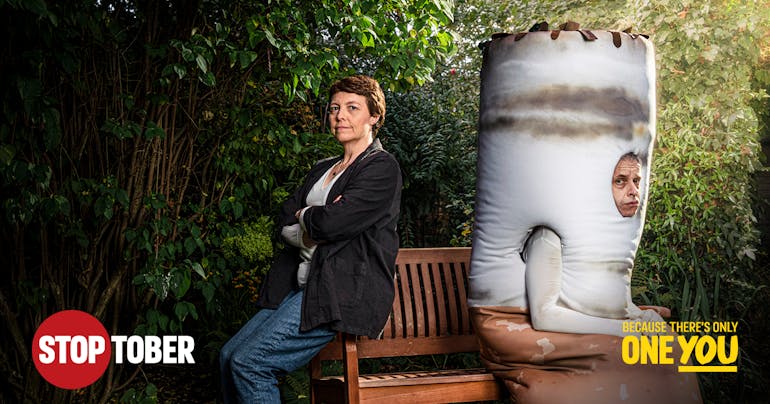9 ways to quit, for the most hardened smoker
Reviewed and fact-checked by Giulia Guerrini, Superintendent Pharmacist. Read our editorial policy to see how we create informative, accurate content.
Stoptober, the 28-day stop smoking campaign from Public Health England, is back for 2019.
Stoptober has driven over 1 million quit attempts to date and is the biggest mass quit attempt in the country. It is based on research that shows that if you can stop smoking for 28-days, you are five times more likely to stay smoke-free for good.
There are a lot of ways to quit and Stoptober can help people choose what works for them. At medino we offer a range of nicotine replacement therapy alternatives and in the meantime, you can check out our helpful tips on ways to quit below.

1. Think about your reasons
If you want to convince yourself that this is the right thing to do, then you need to motivate yourself. Look for a powerful and personal reason to break up with smoking. You might have young children who you want to protect from second-hand smoke. Or you might be thinking about the damage it’s causing your body. Make sure your reasons are always at the back of your mind when you get the urge to have a cigarette.
It can help to make a list of these reasons and to revisit them as often as possible so that you're constantly reminded. Ex-smoker Chris, 28, says: "I used to take a picture of my baby daughter with me when I went out. If I was tempted, I'd look at that".
You can list out your reasons on the Stoptober app. This helps it to be visible when you’re needing that extra motivational push.
2. Make sure you're prepared
It's easy to say that you'll just throw your packs away and get started but that’s easier said than done. If you're a persistent smoker, it's more than likely that your brain is hooked on nicotine. It's best to line up all the support you know you can get beforehand. There are support groups, family and friends you can rely on, apps, quit-smoking devices and medicines you can use. Once you know what's available, it's easier for you to make a promise and stick to it. There are often times where it will be very difficult to not give in to your cravings. Planning and knowing your escape routes in advance can really help.
If you know for instance that going out for a drink with friends in the evening is when you usually have the biggest craving, you can make sure that you've got your e-cigarette or NRT gum etc. with you.
Also, definitely don't be put off if you’ve tried to quit before. Any time you try, you'll learn new techniques and find out what works best. Keep a record of this and use it to help you create a Personal Quit Plan.
3. Consider Nicotine Replacement Therapy
You might have heard about nicotine withdrawal. Don't let it put you off. Despite the headaches, mood swings, or loss of energy, it's not all thaaat bad. That's because Nicotine Replacement Therapy can help you to curb and minimize these urges. From nicotine gum and lozenges to patches, there's a whole lot of support available to you.
Stop smoking aids can help to increase your chances of quitting successfully compared to willpower alone. If you really want, you can look at getting an e-cigarette, this helps when the action of smoking alone is too much for you to quit in the beginning. When you're out, try putting your drink in the hand that usually holds a cigarette, or drink from a straw to keep your mouth busy.
Nicotine replacement therapy (NRT) can double your chances of success. You can read more about the stop smoking treatments available on the NHS or speak to our pharmacist who can help find the mix that's right for you.

4. Lean On Your Loved Ones
It's important that you have a strong support network when you’re trying to quit. Ex-smokers have suggested that telling your friends and family is oftentimes very beneficial. They'll be your crutch when you need encouragement and motivation to keep going even when you're tempted to light up again. Whenever your cravings strike they'll be able to help distract you. You can even try giving up with someone too, you'll both be able to understand what one another is going through which can help when it gets tough.
You can also join a support group or talk to a counsellor. Behavioural therapy is a type of that helps you identify and stick to quit-smoking strategies. Even a few sessions may help.
Did you know that you're up to 4 times more likely to quit successfully with their expert help and advice?
You can also call the NHS Smokefree helpline on 0300 123 1044, open Monday to Friday, 9am to 8pm and Saturday to Sunday, 11am to 4pm.
5. Give Yourself a Break
One of the main reasons people smoke is because nicotine helps them to relax. Once you quit, you'll need to find more ways to help you unwind. Think about what helps you relax the most. Is it listening to your favourite music? Playing sport? Connecting with friends?
You can even try something new. Maybe a new hobby or even give meditation a go. There are great apps such as Headspace or Calm to ease you into it.
It's best to avoid stressful situations during the first few weeks after you stop smoking.
6. Avoid Alcohol and Other Triggers
It's not uncommon for drinking to be the main reason for smoking. When you drink, it's much harder to break up with smoking. Drinking is a very social activity but it's best to limit any alcohol consumption when you're first trying to quit.
It's not just alcohol, you might also crave a cigarette when you drink coffee, instead, try switching to tea for a few weeks. If you usually smoke after a meal, try going straight into something else, like taking a walk or calling a friend. It's all about changing what triggers your smoking.
A craving can last 5 minutes. That's all the time you need to get past the craving. Try making a list of all the 5-minute strategies you can think of.
Drink plenty of water. Water is one of nature's best quit aids and will help you beat back cravings to smoke. Being fully hydrated helps you to be at your best when you have to deal with the discomforts of quitting in the first few weeks.
Here are some of the ways a few other ex-smokers dealt with their cravings:
"I do not fight the cravings and urges to smoke because it only makes me more tense. I try to accept, if not welcome them as a natural part of my addiction recovery. I let them wash over me, take deep breaths and just ride them out."
"Take hot baths and showers. It wasn't possible to crave smoking in the shower, for some reason."
"I cut my coffee intake to one, sometimes two cups per day. If I started grabbing for food, I sucked on sugarless sweet or ate an apple."
7. Start afresh
After finishing your last cigarette (it will be your last), get rid of all your ashtrays and lighters. Wash any clothes that might smell like smoke and clean your carpets and furniture which might hold any residual smoky smell.
8 Try and Try Again
This might not be your first time trying, but don't worry. May others are in the same boat. Think about what led to your relapse last time and use this as an opportunity to ramp up your commitment to breaking up with smoking. Once you've made the decision to quit, set a "quit date" to set it in stone.
Don't let past attempts put you off. Look back at what your experience has taught you and know that you’re really going to do it this time. Be patient with yourself and willing to devote full attention to your quit program. Just relax into your quit and take it one day at a time. The difficulties of nicotine withdrawal pale in comparison to the strength and empowerment that comes from beating nicotine addiction.
9 Get Moving
Making sure you're active can help to curb those nicotine cravings. When you want to reach for a cigarette, put on your running shoes or yoga leggings instead. Even just going for a walk or pulling some weeds in the garden is enough. A review of scientific studies have proven that exercise, even a 5-minute walk or stretch, cuts cravings and may help your brain produce anti-craving chemicals.
When you have the urge to smoke, just do something active instead. Go to the gym or for a swim, or do a little gentle exercise like a short walk. It really does help.

In addition to all of these tips, think about all the money you'll save. Stoptober have a handy app which you can download which figures out how much richer you will be. Reward yourself by spending part of it on something fun.
Never give up even if you don't feel well. See your doctor if need be. Remember quitting isn't an event, it is a process. Everyone's process is different. It does get better for some earlier, and for others later.
If you need any advice, help, or inspiration, as Superintendent Pharmacist at medino, I’d be more than happy to help.
You can get a hold of us on https://twitter.com/wearemedino or https://www.facebook.com/wearemedino/
Or why not check out our Nicotine Replacement Therapy section?
Sources:
- NHS - Quit smoking this January - Better Health
- WebMD - 13 Best Quit-Smoking Tips Ever
- NHS - Quit smoking this January - Better Health
- Verywell Mind - 10 Practical Tips to Help With Nicotine Withdrawal
- Cancer Research UK - How do I stop smoking?

